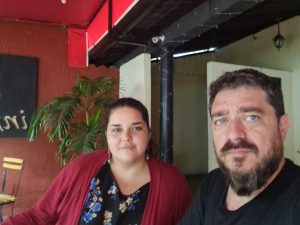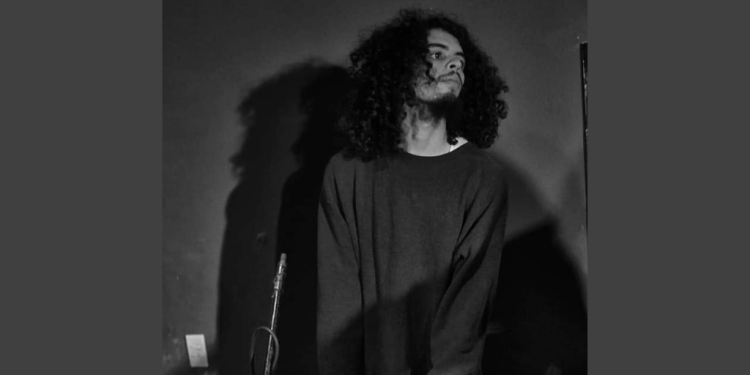By Lisbeth Moya Gonzalez, a Cuban writer and journalist.
We reproduce this appeal by Lisbeth Moya Gonzalez who has met Pablo Almeida, legislator of Socialist Left (IWU-FI), in the Left Front-Unity (FITU), of the City of Buenos Aires, Argentina, in Havana. Almeida is visiting Cuba and has expressed his solidarity with Abel Lescay.
The 11 July demonstrations meant a big change for Cuba. For the first time since 1959, Cubans took to the streets in different provinces of the country for many reasons, but above all because of the popular discontent generated by the economic crisis and the management of the bureaucracy.
While the US government’s sanctions have hit the economy, when analysing Cuba, one cannot overlook the existence of bureaucracy and the lack of popular involvement in politics. They heavily punish dissent and the government showed signs of this on 11 July.
The government’s reaction to 11 July and to any kind of dissent, even from the left, is to brand citizens as counter-revolutionaries, politically confused people or “mercenaries” paid by the US government.

The “Archipelago” phenomenon was an example of this. It is a platform that, after the events of 11J, sought to establish a national dialogue beyond ideologies, and called for a peaceful march on 15 November. This political project was showing signs of a shift to the right, through public projections and the positioning of some of its members.
What is remarkable for this analysis is not Archipelago, but the government’s treatment of dissent. Once again, the media was used without the right of reply to discredit the main organisers in every way and to prove their links with the US government. The government disavowed the march, claiming that Socialism is constitutionally irrevocable and that the intentions of the protest were to overthrow it.
However, one of the most worrying issues is that on the weekend of the march, one of the darkest chapters in Cuba’s history happened again on a massive scale: the “acts of repudiation” returned, events organised by the political power to attack the most private space of those who dissent: their family, their home, with shouts, expletives and all kinds of verbal violence. Imagine waking up to a mob of people in front of your house shouting “counterrevolutionary” at you, and with a political event organised on your doorstep, in your neighbourhood, in front of your children and parents.
This is an act of repudiation, something common and shameful in the Cuba of the 1980s, something that has been discussed many times, something that many Cubans are ashamed of, is repeated today, with the stridency of social networks in between.
In this context, remarkably, Cuba is opening up to the liberalisation of a state-centred economy. The monetary order, a measure already announced to tackle the crisis, which had been noticeable since before COVID-19, came at a time of scarcity and with nuances that were not at all helpful for the people. It is, in fact, a measure of economic segregation that has driven Cubans to desperation, because of the lack of basic products and inflation. The ordinance eliminated the CUC, the emerging “hard currency” that had circulated in Cuba since 1994, the height of the special period, to make way for the freely convertible currency (MLC), as well as any international currency highly traded on the black market.
When announcing the economic order measure, the Minister of Economy, Alejandro Gil, assured that alongside the MLC shops, the rest of the shops would continue to sell all kinds of necessary products in Cuban Pesos and that the purpose of these MLC shops was precisely to collect foreign currency to supply the rest of the shops in Cuban Pesos. This has not happened. The shops to which Cubans who do not have MLCs have access are out of stock and there are fewer and fewer of them every day. Getting basic products in Cuba is an odyssey, and despite the rise in salaries, there is not enough money because the inflationary process is enormous.
It is not surprising then that the people took to the streets, facing such a situation aggravated by COVID-19, the impossibility of dissent and popular participation, and the repetitive political discourse that Cuban leaders crudely use in the media to “legitimise” the Cuban revolutionary process.
In Cuba, the word “left” is taboo. A large part of the population assumes that the government’s discourse and practices are socialist or leftist. This is a dissatisfied citizenry, with very little political preparation, because the curricula, from a very early age, are centred on political indoctrination for the convenience of those in power and not on the development of knowledge and reasoning in conditions of freedom.
It is no accident then that on 11 July people took to the streets. They were not mercenaries or confused beings. Just exhausted people responding to objective contradictions.
On that day a good part of the right-wing took to the streets, yes, but so did the working and marginalised people, the people that the left should represent, the social bases that the left should reach out to. On that day, supporters of the government, young people of the so-called official left, people privileged by the system mostly, also took to the streets.
Amid the chaos, violence from both sides surfaced. They were unarmed demonstrators against all the repressive bodies of the state and those other privileged or old uncritical defenders of the Cuban revolution, armed with sticks and backed by the police.
The Cuban government faced a major crisis of governability and it would be unfair not to consider in this analysis the exhaustive US anti-communist propaganda that has permeated the Cuban imagination through the social networks. But the internal causes of the social outbreak are there, latent in the daily lives of Cubans. These causes remain unresolved and are getting worse every day, due to what July 11 meant for the demonstrators and their families.
To date, the working group on politically motivated detentions of the Cuban civil society platform Justicia 11J has documented 1271 detentions in relation to the social outburst of 11J. Of these people, at least 659 are still in detention. It has been verified that 42 have been sentenced to imprisonment in summary trials and 8 in ordinary trials. The prosecutor’s request is already known for 269 people who are waiting between 1 and 30 years’ imprisonment. The figure of sedition has been used to impose sanctions on at least 122 people, according to this platform, which has been responsible for counting and bringing to light the situation of those involved, as there are no official figures available.
11 July was the peak of the repression of dissent in Cuba. Historically, there was systematic harassment by state security bodies of dissenters across the political spectrum; there were also cases of expulsions from places of study or work for ideological reasons and many other such manifestations. On 11 July, however, the repression was carried out on the bodies of the demonstrators.
Such is the case of the young musician and poet Abel Lescay, who, after demonstrating in the city of Bejucal, they arrested him overnight in his home. This process is particularly serious because they took him to the police station naked and suffered COVID-19 during the arrest.
Abel went out to march like any other citizen, he did not attack property and the Prosecutor’s Office is accusing him of contempt of the basic figure, contempt of the aggravated figure and public disorder, for which he is being asked to serve seven years in prison.
Lescay was also a student at the Instituto Superior de Arte (ISA) and could lose his degree if found guilty. They will try him on 5 and 6 December at the Provincial Court of Mayabeque.
Cases like this happen in Cuba these days, absurd and inconceivable cases. When I talk about these issues with members of the left in other countries, it is unheard of that anyone should be asked to serve such sentences for exercising the right to demonstrate. “If that were the case, we would all be in jail forever”, an Argentinian friend commented to me.
I write these lines terrified, even though I know what they mean in terms of repercussions for a militant of the alternative left who lives and works in Cuba. I write these lines because the main dichotomy for a left activist in Cuba is to be clear about who I am facing and in what context. Although as socialists we have the mission to fight against imperialism in the world, although these words could be misused for other causes, in Cuba we can no longer remain silent, because it is about the lives of many. It is about the right to dissent and to exist with dignity. I call on the international left militancy and those who read this text not to hesitate to investigate and support the cause of the political prisoners in Cuba.
I call for international solidarity with Abel Lescay, because only then will we be heard. The left must think of itself as one in the world. We cannot think of the oppressor only as a bourgeois, the bureaucracy also oppresses. I never tire of saying it: Yes to Socialism, No to Repression!













